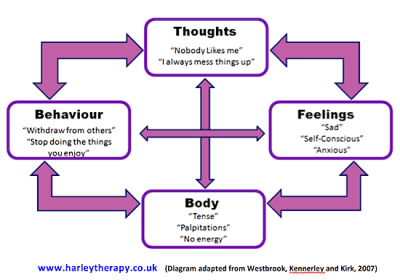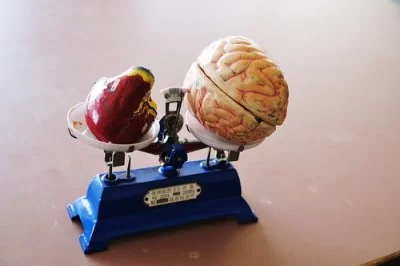Thinking vs Feeling – Which One is Holding You Back?

by Andrea M. Darcy
Do you overanalyse everything? Or are you more the type to be an emotional wreck? Between thinking vs feeling, what one is holding you back more, and what might that mean for your mental health?
Thinking vs feeling – do you really know the difference?
Thoughts are mental, or ‘cognitive’, processes. Our brains associate one bit of information with another and create frameworks such as beliefs, perspectives, opinions, judgements, and ideas.
Feelings are connected to emotions. An emotion is an automatic and temporary reaction to a stressor in a part of the brain not connected to thinking and reasoning. Our feelings, on the other hand, are connected to thinking. They are our conscious processing of an emotion, where we assign the emotion meaning. Feelings can be long lasting.
For example, if we are suddenly face to face with a rabid wolf, our brain releases neurotransmitters and hormones that mean our heart races and we breath quickly, the emotion of fear. We then later explain how we were feeling. Perhaps afraid. Or, if you were a hunter with as gun who had the job of killing the rabid wolf, you might decide the feeling was exhilaration.
How thoughts and feelings are connected
Thinking can certainly determine how we feel. For example, if our thoughts are self defeating after we don’t do as well on a test as we hoped, we can start to feel depressed.
And then a third element comes in that creates a sort of ‘triad’ with thinking and feeling, and that is behaving. Our behaviours are often a direct result of our thoughts and feelings.
The CBT thoughts and feelings cycle
Cognitive behavioural therapy (CBT) is based on this idea that our thoughts and feelings become behaviours. It identifies a cycle, where that behaviour, if negative, then leads to another depressed thought, and on we spiral.
 The focus of CBT therapy is to help you disrupt the cycle. It helps you to listen to and recognise when a thought is negative and untrue. And it shows you how to turn negative thinking into balanced thinking, before it sends you down the road of a feeling and a negative behaviour.
The focus of CBT therapy is to help you disrupt the cycle. It helps you to listen to and recognise when a thought is negative and untrue. And it shows you how to turn negative thinking into balanced thinking, before it sends you down the road of a feeling and a negative behaviour.
Thoughts, feelings, and mental health disorders
You might assume that depression is a ‘feeling’ disorder. You ‘feel’ sad and bad, and are convinced your problem is too much feeling.
But in many ways depression is more a thinking disorder. We feel sad and bad because our thoughts have become very negative about ourselves and the world, full of doom and gloom or even destruction.
We simply can’t be depressed if we have positive thoughts running through our head about ourselves, the world, and our relationships with others.
Anxiety is of course the clear winner when it comes to thinking disorders. With anxiety, our thoughts race, becoming increasingly illogic. This leads to the feeling of fear and panic.
And almost all personality disorders have thinking issues at their core. The very definition of a personality disorder is that since early adolescence or early adulthood, you see yourself, others, and the world differently than the way others see things. Your thinking, is different, and it makes relating to others challenging.
The mental health disorders caused by feelings

photo by: Joshua Fuller
But sometimes it really is feelings that are the problem. Some people have no control over their emotions. Their feelings vary wildly, in a way that is overwhelming for them and those around them.
This is called ‘emotional dysregulation’, and it’s a main symptom of borderline personality disorder (BPD) and bipolar disorder.
Borderline personality disorder
When you have BPD, it’s like you lack an invisible ’emotional skin’ others have. This leaves you sensitive to everything, especially rejection. When you sense any sort of rejection your emotions roar forth and you do things you later regret, such as being mean, or pushing people away.
Of course it is the thought that you are being rejected that starts things. But the emotions take over and you stop thinking and act impulsively. If you have BPD, you will also swing wildly with your feelings, being happy and in love one minute, and full of rage and hatred the next.
Bipolar disorder and thinking vs feeling
BPD can sometimes be misdiagnosed as bipolar disorder, the other mental health disorder where feelings can lead the way. If you have bipolar disorder, you will go through depressions. But you will also have manic episodes.
Mania sees you on an emotional high, where you feel so good that it changes your thinking. You think you are invincible, that you can do anything. You end up acting impulsively in ways that can see you navigating the damage once you come down from your emotional high days later.
Can you trust your thoughts and feelings?

By: ajari
“I think, therefore I am”, said French philosopher Descartes. Clearly, when it came to thinking vs feeling, he trusted the former. But that was back in the early 17th Century, and we know a lot more these days.
Saying we are our thoughts and feelings is a bit like saying a computer is its programs. It’s not. It’s a machine apart from the programs.
Perhaps the biggest mistake we can make is to think we ARE our thoughts and feelings. If our thinking and emotions are negative, we can then end up mired in self hatred and despair.
Thoughts and feelings are important and useful tools. They both show us what we:
- like and don’t like
- can and can’t currently handle
- need to look at, process, and deal with
- and where we need to set boundaries with others.
But they are not things we are born with. They are things we learned from the environments we moved through, our family, peer groups, culture. So they are essentially programming, not who we are.
If this sounds hard to believe, if you really worry you are your thoughts, put it this way. We’ve all, at some point in our lives, been so angry we’ve said, “I could kill them!”. It’s an aggressive thought. But it’s not an action. We are not a killer or criminal. We are not what we think, unless we act on it.
Then who am I?
It’s a big question, and one we all answer slowly over the course of a life time. Who we are ends up a mixture of the actions and choices we take, and the personal values we decide to live by.
If you want to get a sense of the ‘You’ behind your thoughts and feelings, a useful modern tool now used my many therapists is mindfulness. This involves a daily practice of sitting quietly, relaxing your body, and watching your thoughts come and go without attaching to or judging them. With time, the thoughts slow and even stop, and you can start to question, “Who is it watching these thoughts?” This ‘watcher’ is you.
Do your thoughts and feelings have the reins? Don’t know who the real you is? Harley Therapy connects you with top London-based talk therapists from the comfort of our central London clinics. Or for affordable UK-wide therapists and online counsellors visit our booking platform.

Andrea M. Darcy is a mental health and wellbeing expert and writer. She also runs a consultancy helping people find their perfect therapy and therapist. Follow her on Instagram for useful life tips @am_darcy





Bravo to Mrs Andrea M. Darcy 🙂
I’m 19teen doing some research deriving from the need to help me in whatever situation I’ve found myself n continue to learn to face, live with and find my way of understanding n functioning enjoy n find help n meaning in my feelings /n thoughts.
I may insert a meaning like this to my fashion collection for my diploma. Whatever the case, I liked how this article had a nice continuous and actual exemples and propositions to simplify and relate.
Hope u continue to be able to do u enjoy and thanks for sharing ur knowledge or views
Bravo to Mrs Andrea M. Darcy
I’m 19teen and read this article which found a firther step of help in order to learn more about other people n find my ways to put into good use n understand how to live a balanced life n unlock my full potential
I want to decide between the terms of feelings, balance and change/growth to apply to showcase through my fashion collection
Whatever the case this article had a nice flow, I appreciated n liked the exemples given to bring mentality work closer to our lives.
I hope u to continue enjoying n finding ur meaning in what u do
Bye:)